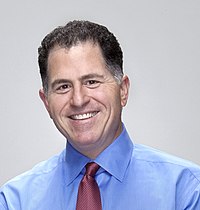Michael Saul Dell (born February 23, 1965) is an American business magnate and the founder and chief executive officer of Dell Inc. He is one of the richest people in the world, with a net worth of US$13.5 billion in 2010.[2]
[edit]Biography
[edit]Early life and education
The son of an orthodontist[3] and a stockbroker, Dell attended Herod Elementary School inHouston, Texas.[4] In a bid to enter business early, he applied to take a high school equivalency exam at age eight. In his early teens, he invested his earnings from part-time jobs in stocks and precious metals.[5]
Dell purchased his first calculator at age seven and encountered his first teletype machine in junior high, which he programmed after school. At age 15, after playing with computers at Radio Shack, he got his first computer, an Apple II, which he promptly disassembled to see how it worked.[6] Dell attended Memorial High School in Houston, selling subscriptions to theHouston Post in the summer. While making cold calls, Dell observed that newlyweds and people moving into new homes were most likely to buy a subscription. He targeted this demographic group by collecting names from marriage and mortgage applications. Dell earned $18,000 that year, exceeding the annual income of his history and economics teacher.[7]
While a pre-med student at the University of Texas at Austin, Dell started an informal business upgrading computers in room 2713 of theDobie Center residential building. He then applied for a vendor license to bid on contracts for the State of Texas, winning bids by not having the overhead of a computer store.[8][9][10]
In January 1984, Dell banked on his conviction that the potential cost savings of a manufacturer selling PCs directly had enormous advantages over the conventional indirect retail channel. In January 1984, Dell registered his company as "PC's Limited". Operating out of a condominium, the business sold between $50,000 and $80,000 in upgraded PCs, kits, and add-on components. In May, Dell incorporated the company as "Dell Computer Corporation" and relocated it to a business center in North Austin. The company employed a few order takers, a few more people to fulfill them, and, as Dell recalled, a manufacturing staff "consisting of three guys with screwdrivers sitting at six-foot tables." The venture's capitalization cost was $1,000.[11][12]
In 1992 at the age of 27, Dell became the youngest CEO to have his company ranked in Fortune magazine’s list of the top 500 corporations.[13] In 1996, Dell started selling computers over the Web, the same year his company launched its first servers. Dell Inc. soon reported about $1 million in sales per day from dell.com.[14] In the first quarter of 2001, Dell Inc. reached a world market share of 12.8 percent, passing Compaq to become the world's largest PC maker. The metric marked the first time the rankings had shifted over the previous seven years. The company's combined shipments of desktops, notebooks and servers grew 34.3 percent worldwide and 30.7 percent in the United States at a time when competitor's sales were shrinking.[15]
In 1998, Dell founded MSD Capital L.P. to exclusively manage his and his family's investments. Investment activities include publicly-traded securities, private equity activities, and real estate. The firm employs 80 people and has offices in New York, Santa Monica and London. Dell is not involved in day-to-day operations.[16]
At a speech before the Detroit Economic Club in November, 1999, Dell defined the "3 C's" of e-commerce (content, commerce, and community) while articulating his strategy for offering a superior customer experience online.[17]
On March 4, 2004, Dell stepped down as CEO of Dell Inc. but stayed as chairman of the board, while Kevin B. Rollins, then president andCOO, became president and CEO. On January 31, 2007, Dell returned as CEO at the request of the board, succeeding Rollins.[18]
Accolades for Dell include: "Entrepreneur of the Year" (at age 24) from Inc. magazine[19]; "Top CEO in American Business" from Worthmagazine; "CEO of the Year" from Financial World, Industry Week and Chief Executive magazines. Dell serves on the Foundation Board of the World Economic Forum, the executive committee of the International Business Council, the U.S. Business Council, and the governing board of the Indian School of Business in Hyderabad, India. He previously served as a member of the U.S. President’s Council of Advisors on Science and Technology.[20]
In July 2010 Dell agreed to pay a $4 million penalty to settle SEC charges[21] of disclosure and accounting fraud in relation to undisclosed payments from Intel Corporation. Dell Corporation and two other company executives also paid to settle all the charges.
[edit]Writings
Dell's 1999 book, Direct from Dell: Strategies That Revolutionized an Industry, is an account of his early life, his company's founding, growth and missteps, as well as lessons learned. The book was written in collaboration with Catherine Fredman.[22]
[edit]Wealth and personal life
As of 2010, Forbes estimates Dell's net worth at $13.5 billion.[23]
Dell resides in Austin, Texas with his wife, Susan, and their four children.[24][25]
[edit]Philanthropy
In 1999, Michael and Susan Dell established the Michael and Susan Dell Foundation, which focuses on children’s causes. By 2010, the foundation had committed more than $530 million to assist nonprofit organizations serving urban communities in the United States and India.[26] The foundation has also provided $65 million in grants to three health-related organizations associated with the University of Texas: the Michael & Susan Dell Center for Advancement of Healthy Living, the Dell Pediatric Research Institute, and the Dell Children’s Medical Center, as well as funding for a new computer science building on the University of Texas campus.[27][28]
In 2002, Dell received an honorary doctorate in economic Science from the University of Limerick in honor of his investment in Ireland and the local community and for his support for educational initiatives.[29]
[edit]Political contributions
In 2005, Susan and Michael Dell were among 53 entities that each contributed $250,000 (the maximum legal donation) to the second inauguration of President George W. Bush.[30]



